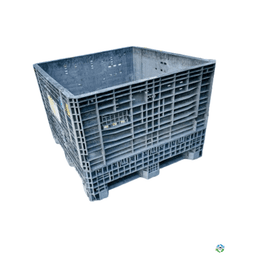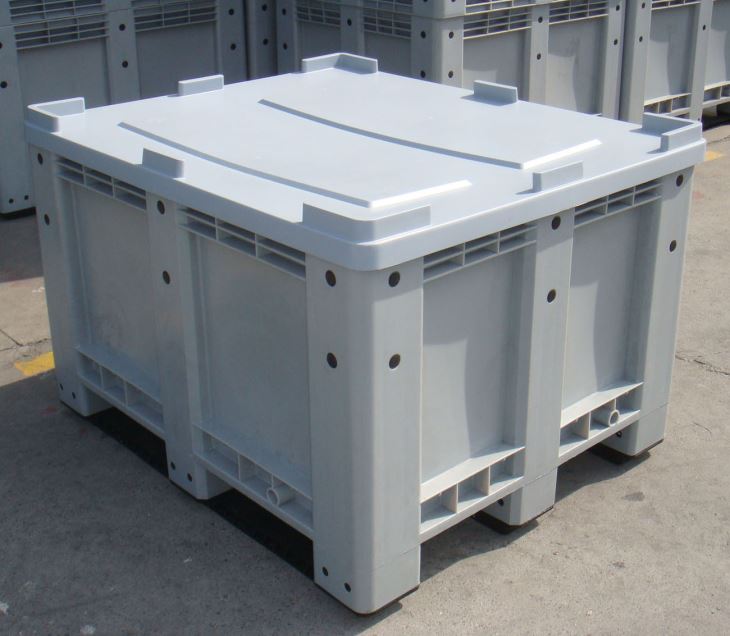Used collapsible containers as eco-friendly options for smart storage systems
Why Mass Containers Are Crucial for Economical and sustainable Transportation
Bulk containers play a necessary function in modern logistics. They facilitate the effective motion of large amounts of items, therefore maximizing transportation procedures. This approach not only reduces prices but likewise lessens environmental impact via lower discharges and waste generation. As markets look for even more sustainable practices, the adoption of mass containers is coming to be increasingly significant. What effects does this change hold for future logistics and supply chain management?

The Advantages of Utilizing Bulk Containers in Logistics
Mass containers change logistics by improving performance and sustainability. These containers enable the transport of huge amounts of products in a solitary journey, significantly minimizing the number of trips required. This not just enhances procedures yet additionally minimizes labor expenses connected with handling, loading, and discharging. Additionally, mass containers are developed to maximize space use within transportation vehicles, guaranteeing that even more products can be delivered concurrently.
The standardization of mass containers likewise simplifies the logistics process. With consistent dimensions, they can be easily piled and saved, causing improved storehouse management. Mass containers often include durable products that protect components from damage during transit, thereby lowering item loss and increasing total integrity. Therefore, organizations can experience boosted supply chain efficiency, eventually causing enhanced success and client contentment. This mix of aspects makes bulk containers an important asset in modern logistics.
Environmental Effect: Minimizing Waste and Carbon Impact
As markets increasingly focus on sustainability, the adoption of mass containers has actually become a crucial technique for reducing waste and lowering carbon footprints. These containers minimize using product packaging products, such as boxes and plastic, therefore especially reducing general waste generation. By combining deliveries, bulk containers boost transport efficiency, enabling even more items to be transported per trip. This reduction in trips directly associates with lower greenhouse gas emissions, adding to a smaller carbon impact.
Mass containers can usually be reused or recycled, additionally alleviating environmental impact. The toughness of these containers guarantees they can endure numerous transport cycles, minimizing the demand for single-use choices. used collapsible containers. By enhancing logistics and advertising effective source usage, bulk containers not only support lasting methods but also urge sectors to align with global ecological objectives. Eventually, their application mirrors a commitment to ecological stewardship and responsible resource monitoring
Cost Financial Savings: Exactly How Mass Containers Lower Transportation Expenditures
While several companies look for methods to enhance their bottom line, making use of bulk containers provides a considerable chance for reducing transport expenditures. Mass containers optimize the quantity of items carried, permitting services to deliver larger quantities simultaneously. This efficiency minimizes the variety of trips required, directly decreasing gas expenses and lessening labor expenditures connected with loading and discharging.
Furthermore, mass containers commonly include streamlined layouts that optimize room application within transportation cars. This implies fewer empty spaces, causing much more reliable usage of available capacity. In addition, the sturdiness of mass containers can lower the risk of item damage during transportation, reducing losses and ensuring that more goods show up undamaged.
Enhancing Supply Chain Efficiency With Bulk Storage Space Solutions
Mass storage space solutions play a crucial function in boosting supply chain efficiency by maximizing supply monitoring. By consolidating products into fewer, larger containers, companies can considerably minimize managing prices connected with regular transfers and processing. This structured approach enables better tracking and monitoring of inventory, ultimately causing enhanced functional efficiency.
Streamlined Inventory Monitoring
Efficient inventory monitoring is vital for maximizing supply chain procedures, especially when organizations take on bulk storage remedies. These options make it possible for organizations to preserve higher stock levels while lessening the frequency of replenishment. By combining materials right into bulk containers, business can improve their stock processes, minimizing the complexity linked with tracking multiple smaller sized plans. This technique helps with precise inventory counts and improves forecasting accuracy, permitting even more educated decision-making. On top of that, bulk storage remedies simplify warehouse company, making it less complicated to find and accessibility products when required. Therefore, companies can achieve a more efficient inventory turnover price, eventually improving overall supply chain performance and minimizing the chance of stockouts or overstock circumstances.

Minimized Handling Expenses
The application of bulk storage space solutions not only enhances stock administration yet additionally substantially lowers taking care of expenses throughout the supply chain. By settling materials right into mass containers, firms lessen the demand for frequent handling and transfer in between various storage and transportation systems. This method cuts down on labor expenses related to loading, discharging, and relocating smaller packages. Additionally, bulk storage minimizes the regularity of deliveries, bring about reduced transportation prices and reduced fuel consumption. As a result, businesses can maximize their logistics procedures, allowing for a much more reliable allocation of sources. Eventually, reduced taking care of costs contribute to enhanced total supply chain efficiency, fostering a setting that supports both sustainability and economic stability.

Convenience of Mass Containers Throughout Numerous Industries
Although several markets have unique demands for transport and storage, mass containers have actually become a functional solution that meets a variety of demands. These containers, varying from huge bins to specialized tanks, can suit diverse materials, consisting of powders, fluids, and granules. In the agricultural field, mass containers promote the transportation of plant foods and grains, while the food and drink market uses them for components and completed items. The chemical market depends on mass containers for securely transporting dangerous materials, guaranteeing compliance with safety and security guidelines. Furthermore, building firms benefit from bulk containers for moving aggregates and various other materials. Their adaptability prolongs to various settings of transportation, consisting of trains, ships, and trucks, improving logistical performance. This versatility not just enhances operations across various fields but also advertises sustainability by lowering packaging waste and optimizing space in transportation. Mass containers play a vital role in modern supply chain administration.
Future Patterns in Mass Container Usage and Sustainability
The future of bulk container usage is increasingly formed by cutting-edge materials advancement that improves sustainability. Furthermore, automation in logistics promises to streamline operations, minimizing waste and enhancing efficiency. Accepting circular economic climate methods will further reinvent exactly how bulk containers are made, made use of, and recycled, fostering an extra sustainable transport landscape.
Innovative Materials Advancement
As markets significantly focus on sustainability, cutting-edge products development in mass containers becomes a considerable consider boosting environmentally friendly transport options. Producers and scientists are checking out biodegradable plastics, recycled composites, and lightweight steels to lower environmental effect. These products not only reduce waste but likewise improve fuel performance by lowering the overall weight of containers. Additionally, innovations in wise materials, which can adjust to varying problems, improve the resilience and capability of bulk containers. The integration of these cutting-edge materials lines up with round economic climate principles, promoting reuse and recycling. As the demand for sustainable practices grows, the development of such products will play an essential role fit the future of mass container usage in logistics and transportation.
Automation in Logistics
Considerable developments in automation are poised to transform logistics and the utilization of mass containers, boosting sustainability in transportation. Automated systems, consisting of drones and autonomous automobiles, are enhancing the movement of bulk containers, lowering the dependence on typical fuel-powered transport. These modern technologies maximize directing and packing processes, enhancing and minimizing vacant miles gas efficiency. Furthermore, automated supply administration systems enhance monitoring and tracking of mass containers, making certain better resource allocation and lowered waste. The assimilation of the Web of Things (IoT) enables real-time data analysis, making it possible for positive decision-making that aligns with sustainability goals. As automation remains to advance, it is expected to drive additionally technologies in mass container use, ultimately supporting even more sustainable logistics techniques and reducing the environmental influence of transportation.
Circular Economy Practices
Developments in automation are establishing the stage for an extra incorporated technique to circular economic climate techniques in the domain of mass container usage. As markets progressively welcome sustainability, bulk containers are being created for long life and reusability. This change not only lessens waste but also improves resource performance. Business are embracing methods such as closed-loop systems, where used containers are gathered, reconditioned, and reintroduced right into the supply chain. Additionally, clever modern technologies track container life process, assisting in far better management and reducing environmental influence. The collaboration between manufacturers, logistics companies, and end-users is necessary in developing requirements for lasting container use. used bulk containers. Future trends show an expanding emphasis on products that are recyclable and eco-friendly, click here additional reinforcing the round economic climate's concepts in mass transport

Regularly Asked Questions
What Products Are Mass Containers Normally Made From?
Mass containers are normally created from resilient products such as high-density polyethylene, cardboard, light weight aluminum, and steel. These products give defense, stamina, and versatility, making them appropriate for delivering different goods in different markets successfully.
Exactly how Do I Select the Right Dimension Mass Container?
Choosing the appropriate dimension mass container entails examining the volume of materials to be transported, considering handling tools compatibility, and assessing storage room needs. Proper size guarantees performance in transportation and lessens waste throughout shipment.
Are Mass Containers Reusable or Recyclable?
Bulk containers are commonly multiple-use, made for multiple journeys, enhancing sustainability. Lots of can likewise be reused, depending upon the products utilized. Choosing recyclable options additionally supports environmental goals and minimizes waste in transport techniques.
What Safety Laws Apply to Mass Container Transport?
Security guidelines for bulk container transport include conformity with the Department of Transportation standards, proper labeling of unsafe materials, architectural honesty analyses, and adherence to weight restrictions to assure risk-free handling and prevent crashes throughout transit.
Exactly How Can Services Change to Using Mass Containers Properly?
Organizations can alter to bulk containers by reviewing current logistics, training staff on handling, investing in suitable devices, optimizing stock administration, and teaming up with suppliers to guarantee compatibility and efficiency throughout the supply chain.
As sectors increasingly prioritize sustainability, the adoption of mass containers has actually emerged as a vital approach for lowering waste and reducing carbon impacts. By consolidating products right into mass containers, business can streamline their inventory procedures, reducing the intricacy linked with tracking multiple smaller bundles. As industries progressively prioritize sustainability, ingenious materials advancement in bulk containers emerges as a substantial aspect in improving environmentally friendly transportation services. Automated systems, including drones and autonomous vehicles, are enhancing the movement of bulk containers, decreasing the reliance on conventional fuel-powered transport. Additionally, automated stock administration systems boost monitoring and surveillance of mass containers, ensuring far better resource allotment and decreased waste.